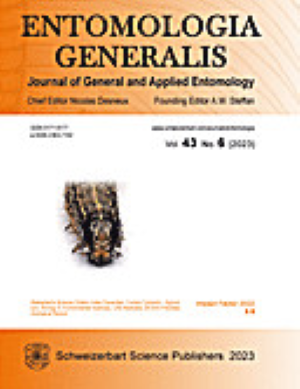Unraveling the feeding response and intergenerational sublethal effects of flonicamid on Rhopalosiphum padi
IF 4.6
1区 农林科学
Q1 ENTOMOLOGY
引用次数: 0
Abstract
Flonicamid is a systemic insecticide effective against sap-sucking insect pests, including wheat aphid, Rhopalosiphum padi. However, no research has been conducted on the effects of sublethal concentrations of flonicamid on key demographic parameters and feeding behavior of R. padi. In this study, we examined the sublethal effects of flonicamid on the biological characteristics along with the feeding behavior of R. padi using age-stage, two-sex life table approach, and electrical penetration graphs (EPGs). The toxicity bioassays showed that flonicamid exhibited high toxicity against R. padi adults after 48 h treatment. The adult longevity, fecundity, and reproductive days of the F0 generation were significantly reduced following R. padi exposure to the LC5 and LC10 of flonicamid. Intergenerational sublethal effects of flonicamid were observed on the developmental stages of the progeny generation (F1) such as increased pre-adult stages and decreased longevities. The reproduction and life table parameters, including fecundity, R 0, r, λ, and reproductive days (RP d ) were significantly decreased in F1 generation at both sublethal concentrations of flonicamid as compared to control. Moreover, the EPG data showed that the total duration of phloem sap ingestion and concurrent salivation (E2) were significantly decreased in F0 at both LC5 and LC10, while in F1 generation, the E2 was substantially reduced only at LC10 of flonicamid compared to control. Together, our findings demonstrated that sublethal concentrations of flonicamid negatively affect the demographic parameters and feeding behavior, which consequently inhibit the population growth of R. padi. These sublethal effects are an added benefit to the present mortality effects, which might be crucial in controlling this key pest.揭示氟啶虫酰胺对Rhopalosiphum padi的摄食反应和代际亚致死效应
氟啶虫酰胺是一种内吸性杀虫剂,可有效防治吸食汁液的害虫,包括小麦蚜虫(Rhopalosiphum padi)。然而,目前尚未研究亚致死浓度的氟啶虫酰胺对R. padi的主要数量参数和取食行为的影响。在本研究中,我们采用年龄阶段法、双性别生命表法和电穿透图法(EPGs)研究了氟啶虫酰胺对桡足类桡足虫的生物学特征和摄食行为的亚致死效应。毒性生物测定结果表明,氟啶虫酰胺在48小时的处理后对稻飞虱成虫具有很高的毒性。在氟啶虫酰胺的LC5和LC10浓度下,R. padi的成虫寿命、繁殖力和F0代的繁殖天数均显著降低。观察到氟啶虫酰胺对后代(F1)发育阶段的代际亚致死效应,如成鱼前期增加和寿命缩短。与对照组相比,两种亚致死浓度的氟啶虫酰胺均显著降低了F1代的繁殖和生命表参数,包括受精率、R 0、r、λ和繁殖天数(RP d)。此外,EPG数据显示,F0代在LC5和LC10时摄取韧皮部汁液和同时流涎的总持续时间(E2)均显著减少,而F1代与对照相比,仅在氟啶虫酰胺的LC10时E2显著减少。总之,我们的研究结果表明,亚致死浓度的氟啶虫酰胺会对R. padi的繁殖参数和摄食行为产生负面影响,从而抑制其种群增长。这些亚致死效应是目前死亡率效应的额外好处,可能对控制这种关键害虫至关重要。
本文章由计算机程序翻译,如有差异,请以英文原文为准。
求助全文
约1分钟内获得全文
求助全文
来源期刊

Entomologia Generalis
生物-昆虫学
CiteScore
7.10
自引率
18.80%
发文量
72
审稿时长
>12 weeks
期刊介绍:
Its scope covers all aspects of basic and applied research dealing with insects and more broadly with arthropods inhabiting wild, agricultural and/or urban habitats. The journal also considers research integrating various disciplines and issues within the broad field of entomology and ecology.
Entomologia Generalis publishes high quality research articles on advances in knowledge on the ecology and biology of arthropods, as well as on their importance for key ecosystems services, e.g. as biological control and pollination. The journal devotes special attention to contributions providing significant advances (i) on the fundamental knowledge and on sustainable control strategies of arthropod pests (including of stored products) and vectors of diseases, (ii) on the biology and ecology of beneficial arthropods, (iii) on the spread and impact of invasive pests, and (iv) on potential side effects of pest management methods.
Entomologia Generalis welcomes review articles on significant developments in the field of entomology. These are usually invited by the editorial board, but proposals may be sent to the Editor-in-Chief for preliminary assessment by the editorial board before formal submission to the journal. The journal also considers comments on papers published in Entomologia Generalis, as well as short notes on topics that are of broader interest.
 求助内容:
求助内容: 应助结果提醒方式:
应助结果提醒方式:


